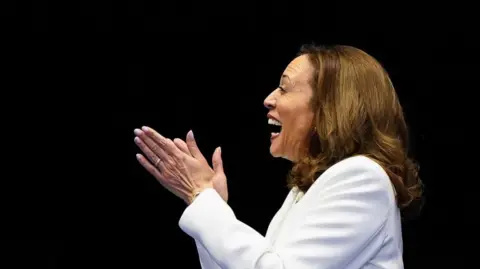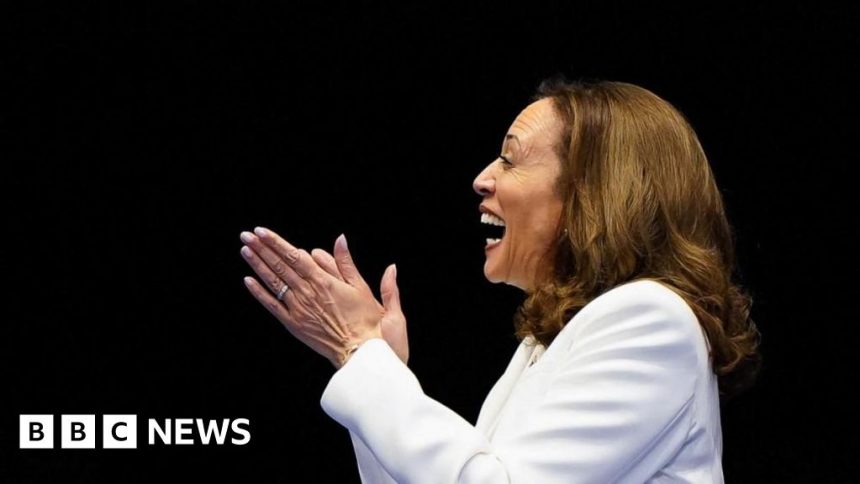Kamala Harris’s pain-free campaign faces first crunch moment
 Reuters
ReutersIn American politics it’s customary to suggest that most voters don’t start paying attention to the presidential election until after the Labor Day holiday weekend.
Well, that occasion – seen here as the unofficial end of summer – has now been and gone. And as a noticeable chill is felt in the air, many more voters will start to take note of politics. That includes the crucial swing voters in a handful of closely contested states who will ultimately decide the race for the White House.
Right on cue, as these eyes start to focus on the election, we have a presidential debate that will see Donald Trump and Kamala Harris go head-to-head for the first time. In fact, it will be the first time the two candidates have ever met in person. The high-stakes event in Philadelphia on Tuesday night is expected to draw in tens of millions of viewers.
Many of these viewers will be getting a first look at Ms Harris beyond the comfort of a rally stage. Before she dramatically replaced Joe Biden at the top of the Democratic ticket in July, Ms Harris’s national profile was unusually low despite her serving as vice-president for almost four years.
And make no mistake, her explosion on to the big stage so late in the election cycle is highly, highly unusual.
The normal rhythms of American politics allow candidates to introduce themselves to the country as they campaign for their party’s presidential nomination in primary contests held much earlier in the year. This process weeds out those who, while popular in their home states, are not ready or equipped to take the leap on to the national stage (see Ron DeSantis) and gives participants vital experience at campaigning and debating.
Ms Harris did none of that this year. When she ran for the Democratic nomination in 2019, she pulled out before a single primary vote was cast after a campaign dogged by poor messaging, in which she struggled to sell her own vision.
Yet, this time around, it appears that Ms Harris’s unusual anonymity may in fact be a secret superpower.
She has been able to present herself to America on her own terms, highlighting her relatively humble background, her record as a prosecutor and her promise to uphold what she sees as fundamental rights such as access to abortion.
Ms Harris has also positioned herself as the candidate of change – a fresh face for the future – even though she has been part of the current administration for almost four years.
Trump is attacking her as a dangerously radical liberal. But to do so he is relying on statements she made and policies she promoted when she was competing in Democratic primaries in 2019. That’s because, to win the Democratic nomination, candidates have to appeal to more liberal members of the party before then trying to move to the centre in the general election.
In this election, Ms Harris did not have to compete against members of her own party to win the nomination and so had no reason to adopt more liberal policy positions as she did in the past.
Just look at her failed bid in 2019, when she advocated for a ban on fracking and offshore drilling as well as universal free healthcare. Both ideas have been rapidly dropped this time around.
Of course, we don’t know what promises Ms Harris would have made in a 2024 primary process, but to win the support of progressives she may well have taken similar positions to the above that Trump would now be using to attack her. No primary contest means less ammunition for the former president. And relying on statements his opponent made five years ago, and policy positions she has since dropped, is blunting his attacks.
This week, Ms Harris announced tax proposals that differentiate her platform from what President Biden was promising. She is calling for a lower tax hike than Mr Biden proposed on the investment earnings of Americans making more than $1 million a year. That is not the sort of idea that would have won her support in any Democratic primary vote.
There are arguably downsides to entering the race at such a late stage, however. Competing for the nomination would have given Ms Harris more experience with unscripted appearances – press conferences, interviews and TV debates.

More on the US election
- SIMPLE GUIDE: Everything you need to know about the vote
- ANALYSIS: Will Harris debate tactics work against Trump?
- EXPLAINER: Seven swing states that could decide election
- IMMIGRATION: Could Trump really deport a million migrants?
- FACT CHECK: Was US economy stronger or weaker under Trump?
So far, she has done only one broadcast interview since President Biden stepped aside and that was a joint appearance with her running mate Tim Walz. That encounter on CNN wasn’t exactly a tough interrogation, and she still struggled to answer what she would do on day one of the job if elected.
At her vast rallies and during her well-received speech at the Democratic National Convention last month, Ms Harris relied on a teleprompter and familiar lines. The 90-minute debate on Tuesday will be her longest unscripted appearance in this campaign.
Trump, who is far more experienced on the presidential debate stage, will try to knock her off her prepared talking points and do what has yet to happen in the race: press Ms Harris aggressively on policy and her changing positions.
And Ms Harris knows better than anyone that the last time Trump took to the debate stage his opponent ended up leaving the race. For America’s surprise presidential candidate, who has completely avoided the challenges and scrutiny of a Democratic primary, this debate represents a sterner test than anything she has faced so far in this pain-free campaign.

North America correspondent Anthony Zurcher makes sense of the race for the White House in his weekly US Election Unspun newsletter. Readers in the UK can sign up here. Those outside the UK can sign up here.








